Yuval Noah Harari Interview!
We chat to this famous thinker about ancient humans, tech, money, stories and more…
Meet world-famous author Yuval Noah Harari! He’s a historian and philosopher who has spent years investigating ancient humans and figuring out how we got so smart. Learn more about this awesome thinker in our Yuval Noah Harari interview…
Who is Professor Yuval Noah Harari?
Name: Yuval Noah Harari
Born: 24 February 1976
From: Israel
Job: Historian, author, philosopher and all-round clever chap!
Famous for: Writing best-selling books about human history and technology. They’ve sold over 40 million copies and been translated into 65 languages!
Hobbies: Playing board games, watching telly, walking and meditating
Prof. Yuval Noah Harari interview
NGK: Hi Yuval! What can you tell us about ancient humans?
Yuval: We’re used to being the only humans in the world, but if you go back hundreds of thousands of years, the world was actually populated by many types of humans living in different places – some big, some small, and often quite different to us. It’s a remarkable realisation!
NGK: It’s so cool to think that there were once loads of other types of humans around at the same time as us. What were some of the others like?
Yuval: In 2004, scientists on the island of Flores in Indonesia found bones of ancient humans who were just 1m tall and had tiny heads the size of grapefruits!
NGK: Woah! Who were they and how did they get there?
Yuval: Ancient humans reached Flores almost a million years ago before it was an island. But then sea waters rose and it became cut off from the rest of Asia. There wasn’t much food on this island, so scientists think that the smallest humans had the best chance of survival as they didn’t need as much to eat. Then these smaller people had kids of their own – and they became smaller and smaller, generation after generation. So in the end, the inhabitants of Flores became a very, very small type of human, nicknamed ‘Hobbit’! And the same thing happened to the elephants there – so you had very small humans hunting very small elephants. And no, this isn’t a fairy tale!
NGK: Wow! What about other types of humans?
Yuval: Well, you’ve probably heard of Neanderthals. These stocky hunters were more or less the same size as us and lived in Europe. Like us, they knew how to light fires and make tools – but they were a different species. It was thought that they died out, but scientists have recently discovered that ALL of today’s modern humans have traces of Neanderthal in them – because when Homo sapiens (our type of human) arrived in Europe around 50,000 years ago, some of these different animals mixed together and had families! So, almost certainly, you’ll have a great-great-grandparent from thousands of years ago who was a Neanderthal!
NGK: Ha! What can you tell us about OUR type of human?
Yuval: We are a type called Homo sapiens. ‘Sapiens’ is Latin for ‘wise‘ or ‘smart‘. Not very modest, is it? And it’s open to debate whether we really are that wise! I mean, look at how we are treating the planet…
NGK: Hmm, yes… not that wise. Where did we Homo sapiens come from?
Yuval: We originally came from Africa – and now live all over the world. People from Brazil, Australia, Europe, Greenland, Asia, we are ALL Homo sapiens – with a little bit of Neanderthal thrown in!
NGK: But why are we the only humans left?
Yuval: Well, that’s an uncomfortable question! We don’t know for sure, but there is a lot of evidence that points the finger at us. One theory is that as Homo sapiens spread from Africa they were better at everything than other types of human – better at hunting, at climbing trees to pick fruit and so on – and so we didn’t leave a lot of food for the others. The other theory is that there were violent clashes between Homo sapiens and the other humans – like the wars we have today – and that we killed off the other humans in the world.
NGK: Oh no! How did we Homo sapiens manage to spread all over the world?
Yuval: Because of a very important but very small human invention – the needle!
NGK: Eh? Please explain!
Yuval: With a needle, you can make warm clothes! And this was crucial for Homo sapiens to survive as we crossed through the Arctic to America, in minus 50 degree temperatures. Ancient humans took the furs and skins of different animals and sewed them together to make thermal clothing. Without this, we couldn’t have spread around the world.
NGK: How did Homo sapiens’ brains become clever enough to invent stuff like needles and rafts?
Yuval: It’s all connected to fire! We’re the only animal that has learned to control and ‘befriend’ fire – the most ferocious and wild thing out there. And this transformed everything…
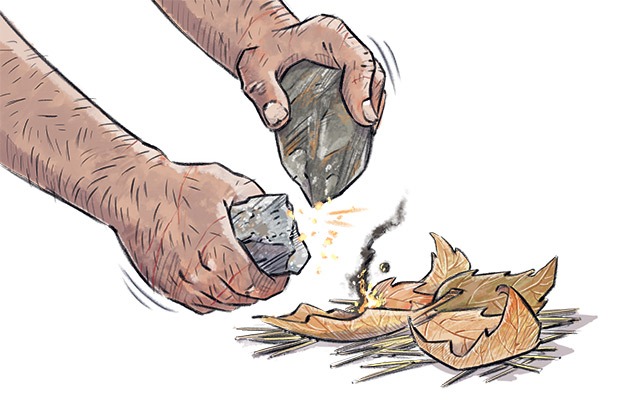
NGK: How so?
Yuval: Originally, like other animals, ancient humans ate raw food. And food can be hard to eat when it’s uncooked. Have you ever tasted a raw potato? It’s yucky, and it’s also poisonous! But amazingly, if you take this disgusting, dangerous thing and put it in fire, suddenly it tastes delicious and is more nutritious. And this gave Homo sapiens more energy and more time.
NGK: In what way?
Yuval: When we eat something that’s cooked, we don’t need to spend hours and hours consuming and digesting it, like our cousins, the great apes, do. And that means more energy can be diverted to our brains, which is what enabled them to grow big and have the ability to invent stuff!
NGK: What helps historians learn about ancient humans?
Yuval: One of the best sources of evidence is ancient art made tens of thousands of years ago. Some of the most famous paintings were found in a cave called Lascaux in France by a group of teenagers in 1940. The teens were exploring in the woods when they saw a hole and crawled inside! They stumbled across one of the most important scientific discoveries of the 20th century – huge caves with amazing paintings of mammoths, bison, deer and horses! This totally changed our understanding of the past. Before that, scientists thought ancient humans were like monkeys who couldn’t really do anything. But this old art is as beautiful and sophisticated as anything we can produce today…
NGK: So if those ancient humans were just as sophisticated as modern people, what changed to make us achieve so much?
Yuval: Firstly, it’s our ability to cooperate in very large numbers. Think about a big building near you. Tens of thousands of people had to cooperate to build it. Not just the builders, but the people who fed the builders, and the ones who provided the materials, too. So how do we do it? The answer is with stories. That’s the way you connect a lot of strangers together so they can trust each other and cooperate. If loads of people believe in the same story then they don’t need to know each other personally in order to work as a team.
NGK: Can you give us some examples of the stories humans tell each other?
Yuval: You have mythological stories, about spirits and gods and things like that. But you also have economic stories, like money. We don’t normally think of money as story, but it’s really just a fairy tale for adults! You can’t eat money, you can’t drink it, but everybody wants it, and lots of people do lots of things to get it.
NGK: Haha! It IS kind of weird!
Yuval: You have the biggest storytellers in the world and they wave this colourful piece of paper and say: “This is worth ten bananas,” and all the adults believe it for some reason, and it works! You can give a complete stranger in a supermarket this useless piece of paper and the stranger gives you ten bananas. It’s this ability to come up with these stories and convince people to believe in them – and then cooperate – that made us so powerful!
NGK: We’ll never shop in the same way again! You’re also famous for writing about technology. Should parents be worried about their kids using social media?
Yuval: Technology is at the centre of our lives, so kids need to engage with it. But adults need to teach them how to do that in a responsible way. There are wonderful things about social media – it has unleashed this ocean of creativity, with kids jumping all over the place filming stories! But there are also dangers…
NGK: What sort of dangers?
Yuval: Smartphones can be used to hijack human attention – to grab your brain, sell you things you don’t need and encourage harmful tendencies. Smart people figured out that the easiest way to grab someone’s attention is to press their fear, anger and greed buttons. There are social media users who feed their mind for hours a day with a diet of fear, anger and greed. If you saw them sitting eating sugar for hours on end you would say, “That’s bad for you. Don’t do that!” And it’s the same thing! That’s why it’s good to disconnect sometimes. Meditation helps me with that.
NGK: Are you worried about technology?
Yuval: The thing I”m most afraid of is that we’ll see more technology for monitoring and controlling people. For the first time in history, it’s technically possible to follow everybody all the time – and for governments and businesses to know more about you than you know about yourself! And this allows them to manipulate our emotions and opinions.
NGK: Scary!
Yuval: But it doesn’t have to be like that! We can develop different technology, or we can use the same technology to monitor governments and businesses and make sure there is no corruption and that they pay their taxes! And if we’re smart, we can use Artificial Intelligence wisely, to help us solve climate change.
NGK: Good idea! You’ve always had pet dogs. Do you think humans can learn anything from animals?
Yuval: Absolutely! I don’t think I could have written many of the things in my books if I didn’t have close contact with some animals; my perspective would be different. Only people who don’t have cats or dogs could even have a debate about whether animals have consciousness or emotions!
NGK: We think they do, too! Can you tell us a bit about your meditation practice – how does it work and why do you do it?
Yuval: You just sit with closed eyes for a couple of minutes, or maybe a couple of hours. You don’t look at your smart phone or the television, and you don’t talk to people. It helps because we are flooded with so much information – news and tweets and images – that we don’t have time to stop and think. I think as humans, silence is equally as important as stories, because this is a time that we can really observe things. Meditation is sometimes difficult but it also brings a lot of joy. I do it for two hours every day. It’s a wonderful thing.
NGK: You’ve met so many celebrities from around the globe – movies stars, politicians and business people all want to pick your brains. Who’s the most the most interesting person that you’ve met?
Yuval: I’m less and less excited by meeting famous people. They may be extremely skilful in their field, but on the broader questions, they are just like the rest of us – no one really has the answers. But recently I listened to the most inspiring talk by a Nobel Peace Prize winner from the Philippines, a journalist called Maria Ressa. She spoke about her efforts to stand up for truth, and for freedom of the press under extremely difficult conditions. It left me speechless.
NGK: She sounds amazing. And who would you talk to if you could talk to anyone from history?
Yuval: The Buddha!
NGK: In case our readers don’t know – he’s the founder of a spiritual religion called Buddhism, who lived during the 5th or 6th centuries BC. Why Buddha?
Yuval: The meditation I practice comes from Buddhist teaching. And maybe these are just stories, but the impression is that if one person really understood something deep about life – it was Buddha. So it would be good to talk to him!
NGK: Thanks Yuval. We’ve learned a lot from you!
If you enjoyed this interview, look out for Yuval’s new book series for kids, Unstoppable Us. It tells the strange and remarkable story of how humans took over the world! Out now.
Images of Yuval courtesy of Yuval Noah Harari, and all illustrations (c) Ricard Zaplana Ruiz. All others (c) Adobe Stock.
WANT TO WIN BOTH UNSTOPPABLE US BOOKS? CLICK HERE!
More Like General History
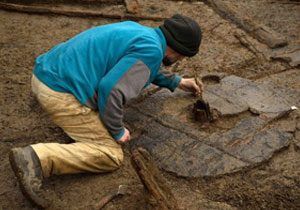
Largest ever Bronze Age wheel unearthed in Britain!
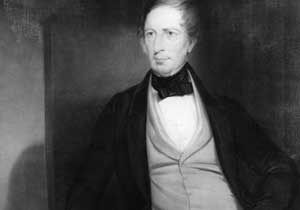
The Amazing Adventures of Charles Sturt
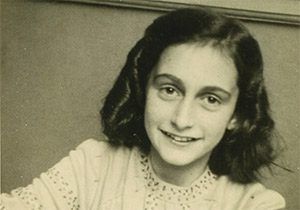
The life of Anne Frank





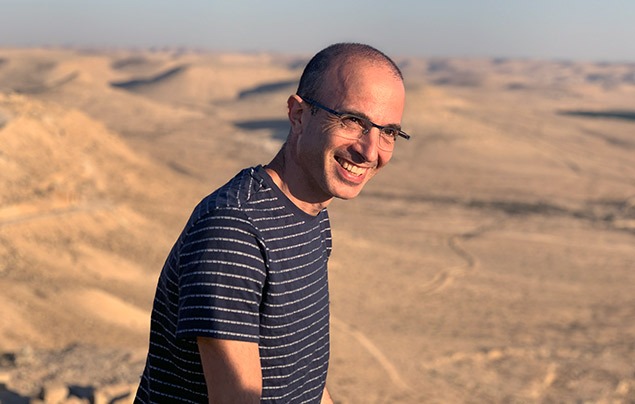
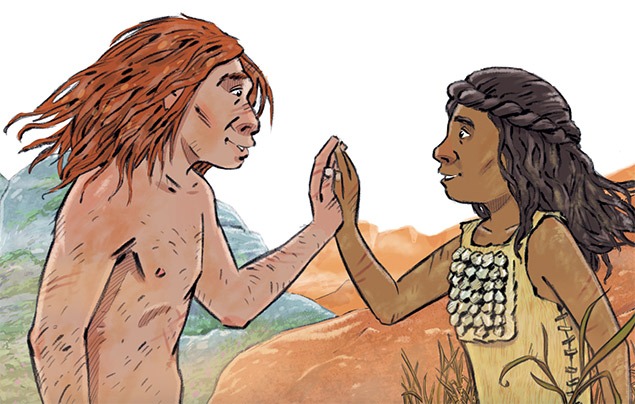
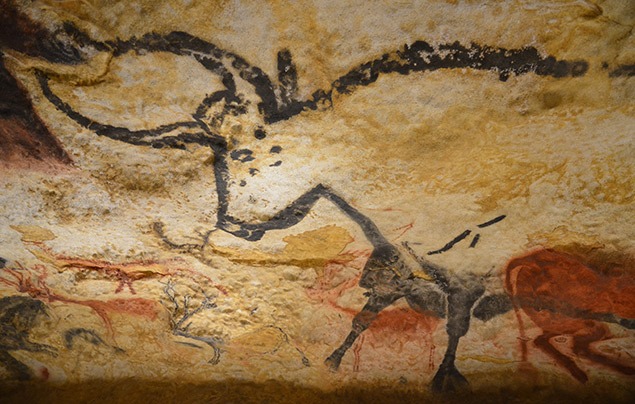

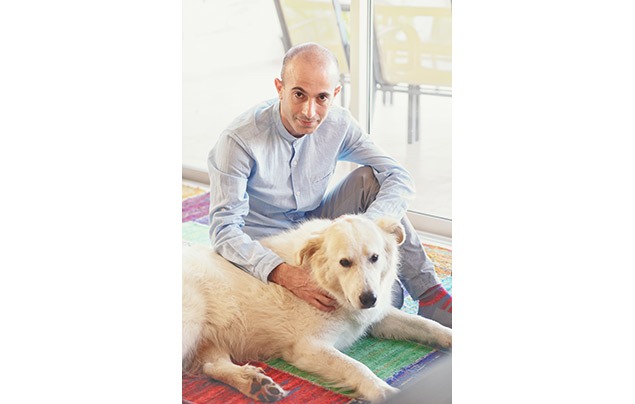




LEAVE A COMMENT
THANK YOU
Your comment will be checked and approved shortly.
WELL DONE,
YOUR COMMENT
HAS BEEN ADDED!
COMMENTS
Thanks this really helped me
wow
I love that information
so cool
Amazing!
cool
so cool!
CUSTOMIZE YOUR AVATAR